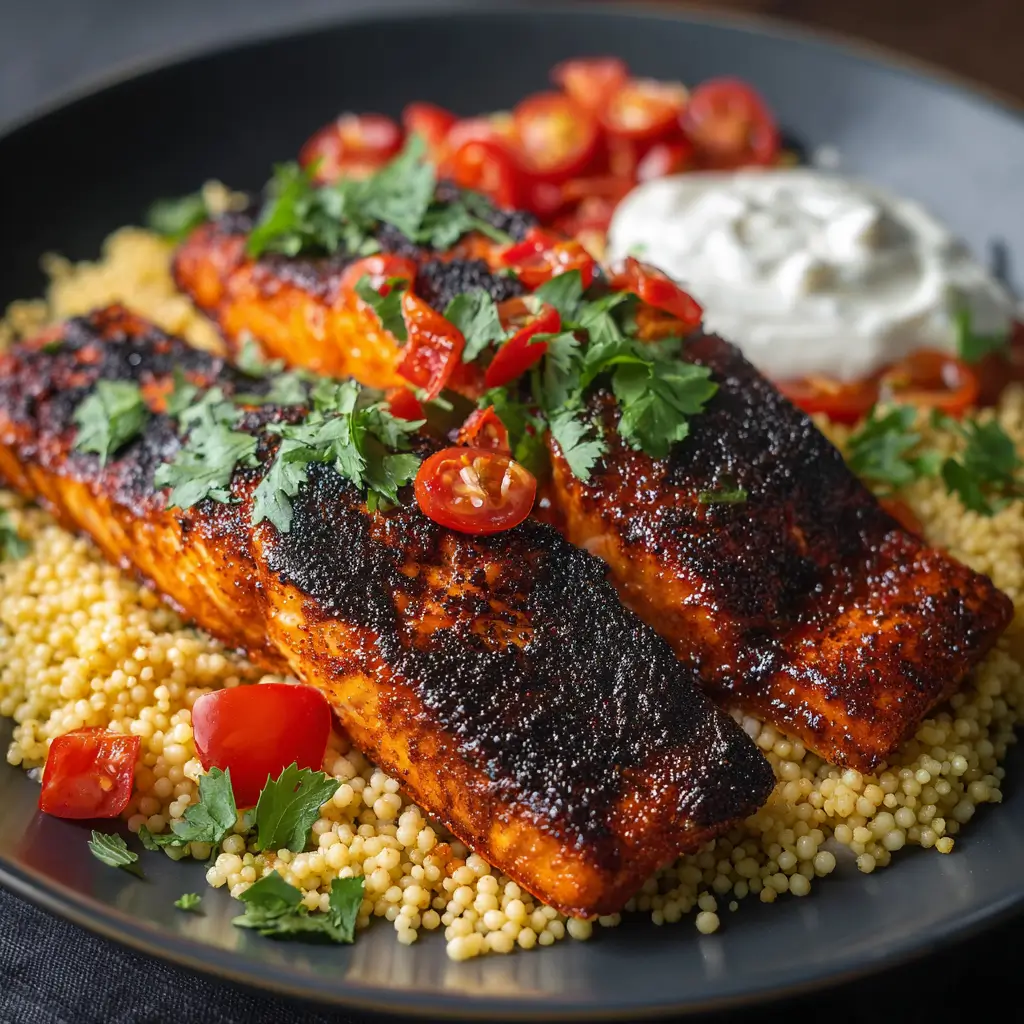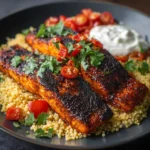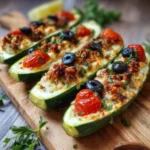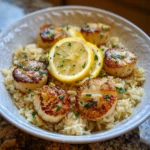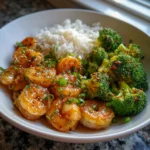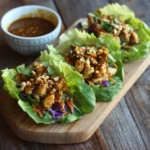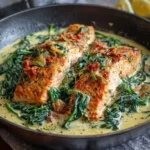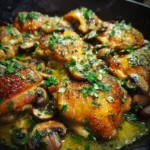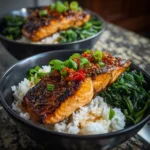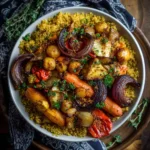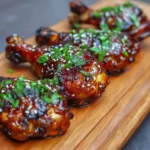Introduction
Spicy Harissa Salmon with Couscous is a vibrant, flavor-packed dish that brings together the bold heat of North African harissa paste with the delicate richness of fresh salmon, served over fluffy, aromatic couscous. This recipe strikes the perfect balance between fiery spice, citrusy brightness, and comforting texture, making it an ideal choice for both weeknight dinners and elegant weekend meals. Whether you’re a fan of Mediterranean cuisine or simply looking to expand your culinary repertoire, this dish delivers on taste, nutrition, and presentation. With its quick preparation time and minimal cleanup, Spicy Harissa Salmon with Couscous is not only delicious but also practical for busy home cooks.
The History
The roots of this dish can be traced back to the culinary traditions of North Africa, particularly Tunisia, where harissa—a fiery red chili paste—originated. Harissa has been a staple in Tunisian kitchens for centuries, traditionally made by grinding roasted red peppers, bird’s eye chilies, garlic, coriander, caraway, and olive oil into a thick, pungent paste. Over time, as trade routes expanded and cultures intermingled, harissa found its way into broader Mediterranean and Middle Eastern cuisines. Meanwhile, couscous, believed to have originated in the Maghreb region (modern-day Algeria, Tunisia, Morocco, and Libya), has been a dietary cornerstone for Berber communities since at least the 9th century. Made from crushed durum wheat semolina, couscous was historically steamed in a special pot called a keskes or couscoussier. The fusion of harissa with salmon may be more modern, reflecting globalized palates and the popularity of healthy, omega-3-rich fish in contemporary diets. Today, Spicy Harissa Salmon with Couscous represents a beautiful amalgamation of ancient flavors and modern wellness trends, showcasing how traditional ingredients can be reimagined in exciting new ways.
Ingredients Breakdown
For the Spicy Harissa Salmon:
- Salmon fillets (6 oz each): Choose wild-caught salmon when possible for superior flavor and higher omega-3 content. The natural oils in salmon pair beautifully with the spicy, smoky harissa marinade.
- Harissa paste (1–2 tbsp per fillet): A North African chili paste that adds heat, depth, and a touch of smokiness. Available in mild, medium, and hot varieties; adjust according to your spice tolerance.
- Olive oil (2 tbsp): Extra virgin olive oil enhances moisture and helps the harissa adhere to the salmon while adding heart-healthy monounsaturated fats.
- Lemon juice (1 lemon): Freshly squeezed juice provides acidity that cuts through the richness of the fish and balances the heat.
- Garlic (2 cloves, minced): Adds aromatic complexity and complements the spiciness of the harissa.
- Ground cumin (½ tsp): Warm, earthy spice that deepens the flavor profile and ties into North African seasoning traditions.
- Paprika (1 tsp): Adds color and subtle sweetness, enhancing the visual appeal and complementing the heat without overwhelming.
- Salt and black pepper (to taste): Essential seasonings that enhance all other flavors.
- Fresh cilantro or parsley (¼ cup chopped): For garnish, adding freshness and herbal contrast.
For the Lemon-Herb Couscous:
- Couscous (1 cup): Instant or pearl (Israeli) couscous can be used. Israeli couscous offers a chewier texture and nuttier taste.
- Vegetable or chicken broth (1¼ cups): Using broth instead of water intensifies the savory notes in the grain.
- Lemon zest (from 1 lemon): Bright, fragrant citrus oil that elevates the entire dish.
- Lemon juice (2 tbsp): Additional tang to balance the starchiness of the couscous.
- Olive oil (1 tbsp): Drizzled into the couscous to prevent clumping and add richness.
- Green onions (2–3, sliced): Mild onion flavor and pop of color.
- Fresh herbs (parsley, mint, or dill – ⅓ cup chopped): Herbs bring vibrancy and freshness, essential for cutting through the spice.
- Toasted pine nuts or slivered almonds (¼ cup): Optional, for crunch and nutty depth.
- Dried apricots or raisins (2 tbsp, chopped): Optional sweet contrast that pairs well with harissa’s heat.
Step-by-Step Recipe
- Prepare the Harissa Marinade: In a small bowl, combine 2 tablespoons olive oil, 1 tablespoon harissa paste (adjust for heat), juice of half a lemon, 2 minced garlic cloves, ½ teaspoon ground cumin, 1 teaspoon paprika, salt, and black pepper. Whisk until smooth and well blended.
- Marinate the Salmon: Pat the salmon fillets dry with paper towels. Place them in a shallow dish or on a plate and generously brush the harissa mixture over the top and sides. Let marinate at room temperature for 15 minutes, or refrigerate for up to 1 hour for deeper flavor infusion.
- Cook the Couscous: Bring 1¼ cups of broth to a gentle boil in a small saucepan. Stir in 1 cup of couscous, cover, remove from heat, and let sit for 5 minutes. Fluff with a fork. Stir in 1 tablespoon olive oil, lemon zest, lemon juice, chopped green onions, and fresh herbs. Fold in optional dried fruit and toasted nuts if using. Cover and keep warm.
- Preheat the Oven or Grill Pan: Preheat oven to 400°F (200°C). Line a baking sheet with parchment paper or foil for easy cleanup. Alternatively, heat a grill pan over medium-high heat.
- Cook the Salmon: Place the marinated salmon fillets skin-side down (if skin-on) on the prepared baking sheet or grill pan. Roast in the oven for 10–12 minutes, or until the internal temperature reaches 145°F (63°C) and the top is slightly caramelized. If grilling, cook for 4–5 minutes per side, depending on thickness.
- Rest and Serve: Allow the salmon to rest for 2–3 minutes after cooking. This helps retain juices and ensures flaky, moist flesh.
- Plate the Dish: Spoon a generous portion of lemon-herb couscous onto each plate. Top with a harissa-glazed salmon fillet. Drizzle with extra harissa or a squeeze of fresh lemon juice. Garnish with chopped cilantro or parsley and additional green onions.
Tips
- Control the Heat: Harissa varies widely in spiciness. Start with 1 teaspoon per fillet and increase gradually. You can also mix harissa with a bit of honey or yogurt to mellow the burn.
- Don’t Overcook the Salmon: Salmon continues to cook slightly after removal from heat. Remove it just before it looks fully opaque in the center to avoid drying out.
- Use Fresh Lemon Juice: Bottled lemon juice lacks the bright, clean flavor needed to balance the dish. Always opt for freshly squeezed.
- Toast the Couscous (Optional): For Israeli couscous, toast it in a dry pan with olive oil before adding broth to develop a richer, nuttier flavor.
- Make Ahead: The couscous can be prepared up to 2 hours in advance. Reheat gently with a splash of broth to restore moisture. The harissa marinade can also be made a day ahead and stored in the fridge.
- Skin-On vs. Skin-Off: Cooking salmon with the skin on helps protect the delicate flesh and creates a crispy layer. It’s easy to remove after cooking if desired.
- Check for Doneness: Use a fork to gently flake the thickest part of the salmon. It should be opaque throughout but still moist.
Variations and Customizations
- Vegetarian Option: Replace salmon with grilled halloumi, marinated tofu, or chickpeas tossed in harissa. Serve over couscous for a plant-powered alternative.
- Gluten-Free Version: Substitute couscous with quinoa, millet, or cauliflower rice to make the dish gluten-free.
- Creamy Twist: Stir a spoonful of Greek yogurt or labneh into the couscous for a creamy, cooling contrast to the spicy salmon.
- Mediterranean Style: Add chopped cucumber, cherry tomatoes, Kalamata olives, and crumbled feta to the couscous for a Greek-inspired variation.
- Seafood Swap: Try harissa-marinated shrimp, cod, or sea bass instead of salmon. Adjust cooking times accordingly.
- Smoky Flavor Boost: Add a pinch of smoked paprika or a drop of liquid smoke to the harissa marinade for a deeper, barbecue-like character.
- Sweet & Spicy Fusion: Glaze the salmon with a mixture of harissa and honey or maple syrup before roasting for a sticky, sweet-heat crust.
- Herb Variations: Experiment with different herbs—try dill for a Persian twist, mint for freshness, or basil for a Mediterranean flair.
Health Considerations and Nutritional Value
Spicy Harissa Salmon with Couscous is not only flavorful but also nutritionally balanced, offering high-quality protein, healthy fats, complex carbohydrates, and essential vitamins and minerals. Here’s a breakdown of the key health benefits:
- Omega-3 Fatty Acids: Salmon is one of the best dietary sources of EPA and DHA, which support heart health, brain function, and inflammation reduction.
- Lean Protein: Each 6-oz salmon fillet provides approximately 34–40 grams of complete protein, aiding muscle repair and satiety.
- Heart-Healthy Fats: Olive oil and the natural oils in salmon contribute monounsaturated and polyunsaturated fats, which help lower bad cholesterol levels.
- Fiber and B Vitamins: Whole grain couscous (or substitutes like quinoa) provides fiber, B vitamins, and sustained energy release.
- Antioxidants and Phytonutrients: Harissa contains capsaicin (from chilies), which may boost metabolism and provide anti-inflammatory effects. Garlic and herbs also offer immune-supporting compounds.
- Vitamin C and Citrus Benefits: Lemon juice enhances iron absorption from plant-based foods and contributes vitamin C, vital for collagen production and immune defense.
- Low in Added Sugar: When made with minimal processed ingredients, this dish is naturally low in sugar and free from artificial additives.
Nutritional Estimate (per serving, with standard couscous):
- Calories: ~520–580 kcal
- Protein: 38–42 g
- Fat: 25–30 g (mostly unsaturated)
- Carbohydrates: 35–40 g
- Fiber: 4–6 g
- Sodium: 450–600 mg (depending on broth and harissa)
Note: Values vary based on ingredient choices and portion sizes. Opting for whole wheat couscous, reducing added salt, or increasing vegetables can further improve the nutritional profile.
Ingredients
For the Salmon:
- 4 salmon fillets (6 oz each), skin-on or skin-off
- 3 tbsp harissa paste (adjust to taste)
- 2 tbsp extra virgin olive oil
- Juice of 1 lemon (divided)
- 2 cloves garlic, minced
- ½ tsp ground cumin
- 1 tsp paprika (smoked or sweet)
- Salt and freshly ground black pepper, to taste
- ¼ cup fresh cilantro or parsley, chopped (for garnish)
For the Couscous:
- 1 cup couscous (regular or Israeli)
- 1¼ cups vegetable or chicken broth
- Zest and juice of 1 lemon
- 1 tbsp olive oil
- 2–3 green onions, thinly sliced
- ⅓ cup fresh parsley, mint, or dill, chopped
- ¼ cup toasted pine nuts or slivered almonds (optional)
- 2 tbsp chopped dried apricots or raisins (optional)
Directions
- In a small bowl, whisk together harissa paste, olive oil, juice of half the lemon, minced garlic, cumin, paprika, salt, and pepper to create the marinade.
- Place salmon fillets on a plate or shallow dish. Brush the harissa mixture evenly over the fillets. Let sit at room temperature for 15 minutes (or refrigerate for up to 1 hour).
- While salmon marinates, prepare the couscous. Bring broth to a boil in a small saucepan. Stir in couscous, cover, remove from heat, and let stand for 5 minutes. Fluff with a fork.
- Stir lemon zest, remaining lemon juice, olive oil, green onions, fresh herbs, and optional nuts and dried fruit into the couscous. Cover and keep warm.
- Preheat oven to 400°F (200°C). Line a baking sheet with parchment paper.
- Arrange salmon fillets on the baking sheet, skin-side down. Roast for 10–12 minutes, or until salmon flakes easily with a fork and reaches an internal temperature of 145°F (63°C).
- Remove salmon from oven and let rest for 2–3 minutes.
- Serve each salmon fillet over a bed of lemon-herb couscous. Garnish with fresh cilantro or parsley and an extra drizzle of lemon juice or harissa if desired.
FAQ
Q: Can I use frozen salmon?
A: Yes, but ensure it’s fully thawed in the refrigerator overnight before marinating. Pat dry thoroughly to help the harissa adhere better.
Q: Is harissa very spicy?
A: It depends on the brand and type. Traditional Tunisian harissa is quite hot, but many commercial versions are milder. Taste a small amount first and adjust quantity accordingly.
Q: Can I make this recipe ahead of time?
A: The couscous and marinade can be prepped in advance, but cook the salmon just before serving for the best texture and flavor.
Q: What can I substitute for couscous?
A: Quinoa, bulgur, farro, or cauliflower rice work well as alternatives, especially for gluten-free needs.
Q: How do I store leftovers?
A: Store in an airtight container in the refrigerator for up to 2 days. Reheat gently in the oven or microwave with a splash of broth to prevent drying.
Q: Can I grill the harissa salmon?
A: Absolutely! Grilling adds a smoky char that complements the harissa. Oil the grill grates well and cook over medium heat to prevent sticking.
Q: Is this dish suitable for meal prep?
A: Yes, though best when salmon is cooked fresh. You can pre-portion the couscous and marinade, then cook the salmon the same day you plan to eat.
Q: Where can I buy harissa paste?
A: Found in the international aisle of most grocery stores, Middle Eastern markets, or online. Brands like Mina, Belma, or Trader Joe’s offer good quality options.
Summary
Spicy Harissa Salmon with Couscous is a bold, nutritious, and satisfying dish that combines North African heat with Mediterranean freshness. Quick to prepare and rich in flavor, it’s perfect for healthy weeknight meals or impressive dinner parties.
